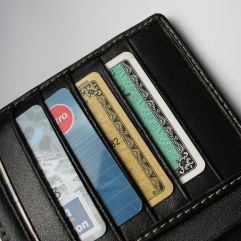Travel News
How to Protect Yourself & Your Finances After Hotel Hacking
 Fourteen big-name hotels under the hotel management company White Lodging—including Marriott and Holiday Inn franchises—were recently hacked, exposing guests’ debit card data. Worried? Here is the full list of hotels that might have been hit.
Fourteen big-name hotels under the hotel management company White Lodging—including Marriott and Holiday Inn franchises—were recently hacked, exposing guests’ debit card data. Worried? Here is the full list of hotels that might have been hit.
Even if you were safe this time, studies have shown that hackers steal data from hotels and the hospitality industry more than any other sector. In fact, as many as 38 percent of credit card hacking cases involved the hotel industry.
Traveling usually means lots of transactions, which means a lot of chances to get swindled. But, there are precautions you can take to keep your finances safe from hotel hacking.
The best thing to assume with technology is that it can easily be hacked. By now, everyone knows the general rules of protecting card information, such as not opening strange emails or giving your information to someone who called you, claiming to be from your bank. Some things, though, are out of your control. The data breaches of the hotels came from the Point-Of-Sale systems of the shops — the physical cash registers — which you can’t do much about, besides not shopping at places that are normally secure. What do you do if you can’t fully trust even reputable businesses?
There are a few ways to keep your money more protected. The smartest thing to do is to find a bank with comprehensive anti-fraud practices. You can pay for fraud protection for your credit card, which obligates the bank to pay you back for erroneous charges, up to a certain amount. Or, make sure your bank monitors strange charges. Remember, any time you make a card transaction, the request has to go to your bank for approval before you’re charged. If you have a bank with good fraud security practices, it should catch and prevent unusually large or strange purchases, then call you to make sure everything is okay.
If you’re traveling abroad, you’ll save yourself peace of mind and unnecessary hassle if you get a “chip card.” The U.S. primarily uses the older and more vulnerable magnetic strip cards, whereas Europe, Canada, Asia, and many other parts of the world, primarily use cards with an encrypted chip embedded within. You may find your magnetic card not being accepted at a foreign merchant. A few banks in America (e.g., Bank of America and Chase) offer chip cards with a magnetic strip, so you’re set wherever you go.
 With chip cards, there is an important distinction between chip and signature and chip and PIN. Chip and signature operates much the same as a magnetic card: swipe and sign (in this case, insert and sign). The benefit of a chip card is that it is harder to physically counterfeit than just magnetic, but if it’s chip and signature, the card itself could still be stolen and used with a forged signature. Chip and PIN, however, works like debit (adding protection) because making a transaction requires the card and your personal PIN. But, this doesn’t prevent fraudulent Internet and phone purchases so, if you’re, say, booking a hotel online, make sure you’re using a computer that has been tested by antivirus software to be free of malware, and that the website you’re putting your data into is official, so thieves won’t steal your card number and have a shopping spree on Amazon.
With chip cards, there is an important distinction between chip and signature and chip and PIN. Chip and signature operates much the same as a magnetic card: swipe and sign (in this case, insert and sign). The benefit of a chip card is that it is harder to physically counterfeit than just magnetic, but if it’s chip and signature, the card itself could still be stolen and used with a forged signature. Chip and PIN, however, works like debit (adding protection) because making a transaction requires the card and your personal PIN. But, this doesn’t prevent fraudulent Internet and phone purchases so, if you’re, say, booking a hotel online, make sure you’re using a computer that has been tested by antivirus software to be free of malware, and that the website you’re putting your data into is official, so thieves won’t steal your card number and have a shopping spree on Amazon.
If you don’t want to risk any ties to your personal bank account and credit score, prepaid cards are an option. There are dedicated prepaid companies (such as Mango and Kaiku), Walmart offers prepaid cards and, for international travel, there are big companies like MasterCard and Travelex. Each institution has different rules and fees, so be sure to read the fine print when taking this route.
The best bet is to get a bank with great fraud practices and enroll in a reliable fraud protection plan. If traveling internationally, use a chip card that offers no foreign transaction fees. For ultimate protection against fraud, of course, just use cash.
For more ways to keep your finances safe, make sure to read:
- Protect Yourself from Latest Travel Scams
- Preventing Hotel Credit Card Fraud
- Hotel Credit Card Fraud
By Cody Brooks for PeterGreenberg.com












